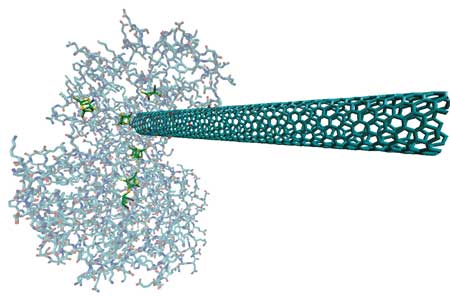| Posted: November 14, 2007 |
'Wiring up' enzymes for producing hydrogen in fuel cells |
|
(Nanowerk News) Researchers in Colorado are reporting the first successful "wiring up" of hydrogenase enzymes. Those much-heralded proteins are envisioned as stars in a future hydrogen economy where they may serve as catalysts for hydrogen production and oxidation in fuel cells. Their report, describing a successful electrical connection between a carbon nanotube and hydrogenase, is scheduled for the Nov. issue of ACS' Nano Letters, a monthly journal ("Wiring-Up Hydrogenase with Single-Walled Carbon Nanotubes").
|
 |
| Computer graphic representation of a single-walled carbon nanotube 'wired up' to a hydrogenase enzyme. (Image: Michael J. Heben, National Renewable Energy Laboratory)
|
|
In the new study, Michael J. Heben, Paul W. King, and colleagues explain that bacterial enzymes called hydrogenases show promise as powerful catalysts for using hydrogen in fuel cells, which can produce electricity with virtually no pollution for motor vehicles, portable electronics, and other devices. However, scientists report difficulty incorporating these enzymes into electrical devices because the enzymes do not form good electrical connections with fuel cell components. Currently, precious metals, such as platinum, are typically needed to perform this catalysis.
|

